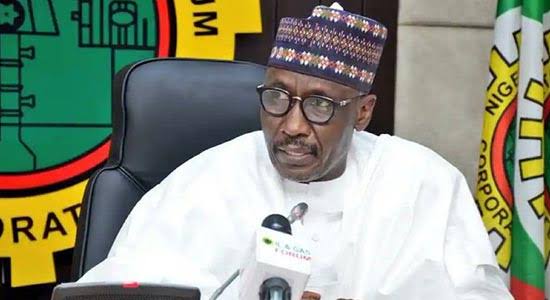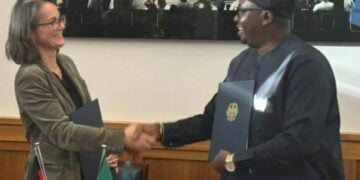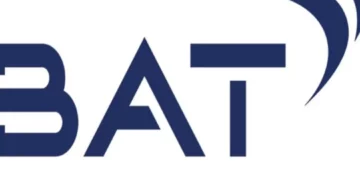The group chief executive officer of the Nigerian National Petroleum Corporation (NNPC) Limited, Mele Kyari has emphatically stated that there is no subsidy on fuel in Nigeria.
He disclosed this to State House correspondents on Monday after a meeting with President Bola Tinubu at the Presidential Villa, Abuja.
This is as Kyari made a projection that Nigeria will start exporting refined petroleum products by 2024.
The NNPC boss made this declaration yesterday at the 2nd edition of the Petroleum and Natural Gas Senior Staff Association of Nigeria (PENGASSAN) Energy and Labour Summit (PEALS) in Abuja where he said that the country will soon be self-sufficient in product production.
Speaking on the theme, “Petroleum Downstream Deregulation and Utilisation for a Sustainable Energy Future in Nigeria”, Kyari also justified the federal government rationale for fuel subsidy removal, adding that without the move the NNPCL would have gone bankrupt.
He said that Nigeria needs to have sustainable energy that is anchored on the resources that are available and a replacement for biomass.
Kyari also advocated for a shift in the transportation system towards other energy sources, particularly for mass transportation which according to him, means Nigeria must do everything possible to bring to reality the current progress that is being made on CNG buses across the country.
“Today, we export 100 per cent of our production, no resource-dependent country does this and that is why we must deliver on our mandate .
So it will be done, and you will see. I don’t want to speak about it. We are tired of speaking about it. But what we must achieve is that this country must be the net exporter of petroleum products.
I strongly believe that in 2024, this country will become the net exporter of petroleum products. The meaning of this is that we will have sufficient volumes in-country, when refined locally, we do have advantages, creating wealth, creating taxes, and all forms of value, creating employment, and so on and so forth”, he said.
Recall that the National President of the Petroleum and Natural Gas Senior Staff Association of Nigeria (PENGASSAN), Festus Osifo, on Friday, said the government has restored subsidy on petrol, despite the official government policy of breaking with the subsidy regime since May.
However, Kyari explained that the occasional queues and lower fuel prices observed in some states were not indicative of a return to fuel subsidy.
He said the government was recovering its full costs from the imported products.
He said “no subsidy whatsoever. We are recovering our full cost from the products that we import. We sell to the market and we understand why the marketers are unable to import.
“We hope that they do it very quickly and these are some of the interventions the government is doing where there is no subsidy.
On fuel queues in some parts of the country , Kyari said these challenges were caused by blockades on roads connecting southern depots to the northern regions of the country, leading to delayed deliveries and temporary supply gaps.
He highlighted that full deregulation of the sector had led to healthy competition among marketers, resulting in reduced fuel prices at some stations.
He said this price competition had led to some customers flocking to stations with lower prices, potentially causing panic among those unaware of the market dynamics.
Kyari reassured the public that there is an ample supply of fuel, with over 1.4 billion litres of products available, both on land and in marine storage.
He also emphasised that there were no issues with the delivery of products.
Regarding foreign exchange issues, Kyari mentioned that the government was actively working to ensure a stable foreign exchange market.
He acknowledged that the current exchange rate of around N770 to the US dollar was part of the transition towards a more stable market, aligning prices of petroleum products with other commodities.
He said “we have seen in very few states pockets of very low queues. Not unconnected with the road situation that we’re seeing the number of blockades on our road crossing products from the southern depots into the northern part of the country and it takes them a much longer time than they do now.
“They have to reroute the trucks around many, many locations for them to be able to reach and that created delays and some supply gaps.
“But that has been filled and we do not see any of such problems again. And secondly, because of the full deregulation that we have in this sector, marketers are now competing amongst themselves.
“So you must have noticed some fuel stations will reduce prices by N2 and N3 so customers will naturally run to the places where you have that reduction in prices.
“And that creates panic, because for those who don’t know why they are doing it, they will think that there’s something wrong happening, or there’s an ominous sign of scarcity or people start queuing up in the fuel stations.
“Otherwise, there is no challenge. Supply is robust. We have over 1.4 billion litres of product in our hands both marine and land. Also there are no issues around delivery of those products into the land.
“So there is no fear, nothing to worry about. But we are also happy that the market forces are now playing out and marketers are competing and of course there are a few issues we’re engaging them to resolve alongside other agencies of government and critical issues around access to foreign exchange.
“And as you all know, the government is doing so much to ensure supply of FX into the market.
“We know that this FX market will stabilise and the current I&E window is around 770. And we know that with those inputs that’s already happening, the inputs of the government today will crystallise and also they will come to an equilibrium position in the FX market and this is a dream of this country.
“So they will have a stable FX market, a stable product market where the prices of products will also speak to prices of other commodities.
“And this is already manifesting and we think this is the economic revolution that this country needs,” he said .
Meanwhile, PENGASSAN national president, Comrade Festus Osifo called for a salary benchmark for oil and gas workers.
Speaking at the PEALS, yesterday, Osifo said the salary was necessary to align with the instrument of trade of the oil and gas commodity.
According to Osifo, the model practiced in Angola, where legislation pegs workers’ salaries in dollars and pays them the legal tender equivalent, is a testament to the possibilities of safeguarding the interests of workers amidst currency fluctuations.
He stresses that the recent floating of the naira by the federal government in the official market has exacerbated the challenges faced by oil and gas workers.
He emphasised that Nigeria must explore innovative solutions to forestall financial losses to workers and prevent undue gains to companies, ensuring a fair and equitable environment for all.





